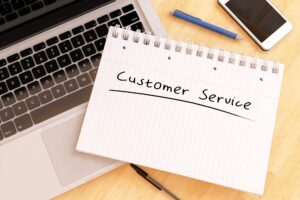
The difference between a thriving business and a struggling one often boils down to one common factor: customer service. Unlike B2C interactions, where transactions are often one-off or short-term, B2B relationships are typically long-term, complex, and involve higher stakes. As such, the quality of customer service can make or break these relationships, directly impacting a business’s bottom line.
To fully grasp the significance of exceptional customer service in B2B, it’s important to understand how it differs from the broader concept of customer experience.
The Role of Customer Service in B2B
Customer service is just a part of the broader customer experience, but it’s a crucial one. It focuses on individual interactions, such as resolving issues, answering queries, or providing assistance at specific touchpoints.
On the other hand, customer experience is a customer’s entire relationship with a company throughout the buyer’s journey. This includes every interaction from brand awareness to sales to post-purchase support. It’s a strategic, proactive approach aimed at building trust and long-term partnerships.
Recent research indicates that poor customer service costs U.S. businesses $846 billion annually. Additionally, 92 percent of B2B customers are more likely to choose a company based on positive reviews. With potential revenue on the line, the way companies treat their clients can either secure long-term loyalty or lead to costly churn.
As businesses grow, scaling customer service to meet increasing demand can be challenging. For instance, a rapidly growing company might struggle to expand its support team fast enough to keep up with new clients. This can result in longer response times, decreased satisfaction, and ultimately, lost revenue. On the other hand, businesses that successfully scale their customer service operations can boost long-term growth and stability.
To truly excel in the increasingly competitive B2B marketplace, it’s vital for businesses to recognize that outstanding customer service starts long before the first support call. It’s embedded in your marketing and sales strategies.
B2B Customer Service Starts Before the First Customer
Before any B2B can excel at customer service, it must have a clear understanding of why it’s in business in the first place. This begins with a well-defined vision, mission, and core values that guide every decision.
When these elements are clearly communicated and aligned with your service approach, they create a strong foundation that informs marketing tactics and the ways you deliver value to customers throughout their journey.
According to B2B business consultant Ian Johnson, “Your company’s customer service approach starts first with marketing, followed by sales, and then finally by your company’s after-sales service support.”
This means it’s vital for companies to craft compelling, truthful, and transparent marketing messages that help prospects better understand a business’s mission, values, products, and services. Misleading promises can lead to mismatched expectations and dissatisfaction down the line.
Next, focus on producing quality leads. Rather than relying on generic lead-generation tactics, invest in targeted marketing campaigns that attract and engage prospects who are a good fit for your services. For example, data-driven strategies such as account-based marketing can help you reach companies that align with your ideal customer profile, reducing the need for stopgap measures like discounting to close deals.
It’s vital to measure the success of customer service initiatives by embedding retention metrics into performance evaluations across sales, marketing, and customer service teams. For example, set clear objectives that link sales and marketing success to customer retention rates. Consider implementing a system that ties sales bonuses not only to new business but also to retention.
B2B Customer Service Best Practices
To create an outstanding customer service experience, focus on making your operations seamless, efficient, proactive, and innovative. Consider the following best practices:
- Seamless communication across all departments. This requires unifying and integrating all departments involved in client interactions. For example, marketing, sales, customer support, accounting, and product teams should have shared access to client information and be able to collaborate effortlessly. Conduct regular cross-departmental meetings to ensure all teams are unified on client needs and service expectations. Clear communication protocols streamline information sharing and reduce the risk of misunderstandings or duplicated efforts.
Tip: Utilize CRMs like Salesforce, HubSpot Sales Hub, or Zoho CRM that suit your business processes and needs. These tools allow real-time updates and shared access to client data across departments.
- Efficiency in service delivery. Efficient processes streamline operations, allowing team members to handle more tasks in less time. This increased productivity means that the organization can manage a larger client base without compromising quality of service. Start by automating routine tasks, such as ticketing and follow-up emails, automated alerts, and chatbots for initial inquiries.
Tip: Regularly review and refine your service workflows to identify and eliminate bottlenecks.
- Proactive customer support. Studies show that 83 percent of customers expect companies to reach out proactively with solutions before they even ask for help. This requires companies to anticipate client needs and address potential issues before they escalate. For example, if analytics of a client’s usage pattern indicates they may be struggling with or underutilizing a particular feature or service, reach out with helpful resources or offer a training session before problems occur.
Tip: Schedule regular check-ins with clients to review their usage and needs. From there, offer tailored advice or service upgrades. It’s a win-win!
- Innovative solutions and approaches. According to Dr. Chris Majors, innovation is rooted in people, creativity, and challenging the status quo. “Successful innovation solves real problems,” Majors says. “It’s about aligning with market needs, not just following trends.” The most effective innovations address genuine challenges clients face—not those that simply cater to the latest buzzwords. For instance, implementing AI-driven analytics can provide businesses with actionable insights to elevate operations and service. Virtual reality (VR) can provide interactive product demos. AI-powered tools can enhance customer support and interaction. Innovative solutions offer scalability, enabling your customer service operations to grow alongside your business.
Tip: Experiment with new tools and approaches on a small scale before a full rollout and gather feedback to refine and improve your innovative solutions.
Transform Your Customer Service with Strategic Marketing

An exceptional B2B customer experience is the cornerstone of sustained success and growth. The stakes are high, and the cost of neglecting the best practices can be significant. Remember, outstanding customer experiences start with effective marketing strategies. A strategic approach considers a company’s vision and mission, organizational goals, marketplace trends, target audience needs, competition, and business opportunities. With input from various departments, a structured and well-executed marketing plan will elevate the customer experience and help companies reach their goals.

